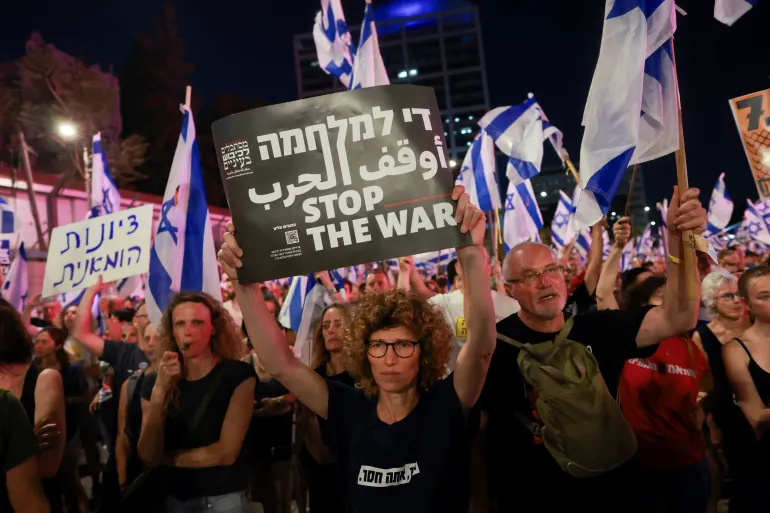
Hamas has reported no progress in ceasefire talks with Israel amidst the ongoing conflict in Gaza, while a large protest in Tel Aviv demanded an immediate truce to secure the return of captives from Gaza. Antigovernment protest organizers estimated that 130,000 people converged downtown, calling for a ceasefire deal to bring the captives home.
Osama Hamdan, a senior Hamas official based in Lebanon, reaffirmed the Palestinian group's willingness to discuss any truce proposal that ends the nearly nine-month conflict. Hamdan stated, "Once again, Hamas is ready to deal positively with any proposal that secures a permanent ceasefire, a comprehensive withdrawal from the Gaza Strip, and a serious swap deal."
Despite these declarations, efforts by Arab mediators backed by the United States have not succeeded in concluding a ceasefire, with both sides blaming each other for the impasse. Hamas insists that any agreement must end the war for good and ensure full Israeli withdrawal from Gaza, whereas Israel only agrees to temporary pauses in fighting until Hamas, which has ruled Gaza since 2007, is "eradicated." Hamdan also accused the United States of applying pressure on Hamas to accept Israel's conditions.
The large protest in Tel Aviv included family members of those held in Gaza, who made emotional appeals at a news conference outside the defense ministry. One relative, speaking to the crowd, urged, "Do not let Netanyahu sabotage the deal again. Netanyahu's insistence on prolonging the war stands between us and our loved ones." The relative added, "Continuing the war means killing the hostages at the hands of the Israeli government. The people understand that Netanyahu prolongs the war for personal reasons – reaching a deal would lead to early elections and end his rule."
Meanwhile, the US has presented new language to intermediaries Egypt and Qatar in an effort to restart the stalled Israel-Hamas negotiations. The revised proposal focuses on the first phase of a three-phase deal laid out by the US. This phase includes a full ceasefire, withdrawal of Israeli forces from densely populated areas of Gaza, and the release of several captives in exchange for hundreds of Palestinian prisoners. The proposal suggests that during the 42 days of the first phase, further negotiations will determine the terms of the second phase. Under this proposal, Hamas could release all remaining male captives, both civilians and soldiers, while Israel could free an agreed-upon number of Palestinian prisoners and detainees. The releases would occur once "sustainable calm" is achieved and all Israeli troops withdraw from Gaza.
However, the new proposal's details remain undisclosed. Hamas wants the negotiations to focus on the number and identity of Palestinian prisoners to be released in exchange for the remaining Israeli soldiers and civilians held in Gaza. Israel seeks broader negotiations, including the demilitarization of Gaza. Hamdan mentioned that Hamas had yet to receive a new ceasefire proposal from the mediators. Hamas political leader Ismail Haniyeh discussed the negotiations with the head of Egypt’s intelligence service.
As discussions of a truce continue, there is increasing pressure on regional and world leaders to halt the Gaza war amid fears of its expansion into Lebanon. Both Hamas ally Hezbollah and Israeli officials have threatened significant escalation. A full-out war in northern Israel and southern Lebanon would be catastrophic for the Middle East, according to analysts. Seven countries have urged their nationals to leave Lebanon urgently, with Saudi Arabia being the latest.
Israel's Defense Minister threatened to bomb Lebanon "back to the Stone Age" if a major conflict erupted, while Iran, Hezbollah's main ally, warned Israel of an "obliterating war" if it attacked Lebanon. Egyptian President Abdel Fattah el-Sisi highlighted the risk of an unprecedented war in the region, calling for urgent international intervention to prevent the conflict from escalating further.











